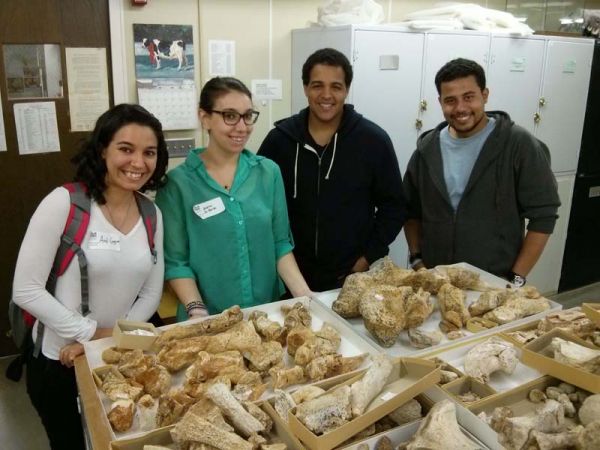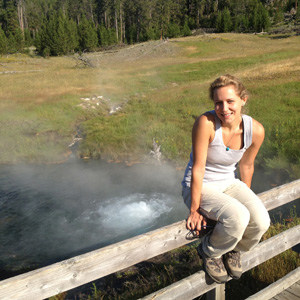By Dawn Mitchell | PCP PIRE Project Assistant
PCP PIRE has a new museum-based internship program that brings interns to the Florida Museum of Natural History to prepare and conduct research on fossil collections from Panama. On January 20th, PCP PIRE’s first group of museum interns arrived at FLMNH. Each of them offers a variety of skills and experience to PCP PIRE and we are excited to get them started in our Panama collections at FLMNH.

Andrea De Renzis graduated from Stony Brook University in New York in May 2014. She majored in anthropology and took classes on primate evolution. These classes helped form her interest in primate origins, which she hopes to pursue as a research topic in graduate school. While a student at Stony Brook, Andrea attended a field school in Turkana, Kenya for six months and helped bioarcheologists there collect human remains. Her stay in Kenya contributed a lot to her interest in vertebrate paleontology because she was surrounded by fossils and received airscribe training to prepare fossil crocodile and turtle material. During her internship at FLMNH, Andrea hopes to gain more experience handling fossils and to learn more about the area of vertebrate paleontology. She plans to start graduate school in the fall.
Justy Alicea also attended Stony Brook University but graduated in the Spring of 2008. He majored in biology with a concentration in evolution. He gained fossil preparation experience during his senior year at Stony Brook by working in the vertebrate paleontology lab. Upon graduation, Justy did fieldwork for three months in the Grand Staircase of Utah as a GSA GeoCorps intern. He was subsequently hired as a senior preparator for the American Museum of Natural History—a position he held for five years. After his time at AMNH, Justy fulfilled his high school dream of going to Japan and taught English there for a year through the Japanese Exchange and Teaching (JET) programme. He is using his time at FLMNH to get back into the mentality of fossil preparation and research before the fall, when he expects to start graduate school.
Ariel Guggino is a junior at the University of Puerto Rico, Mayagúez Campus majoring in geology. Her undergraduate project involved research on the functional morphology of rudist bivalves of southwestern Puerto Rico and she presented a poster on her research at the Tenth International Congress on Rudist Bivalves in Bellaterra, Spain (you can find her abstract in the program booklet here). She is still interested in invertebrate paleontology but is using her time at FLMNH to get more experience in vertebrate paleontology fossil preparation techniques as well as in conducting and presenting research. She plans to pursue a Ph.D. and a career in academia after graduation.
William Tifft graduated from Hamilton College in New York in the spring of 2014 and majored in geoscience. His thesis focused on middle Devonian brachiopods. Will spent the summer following graduation working at the Paleontological Research Institution (PRI) at Cornell. He screen-washed for specimens and was looking for oysters of a similar age as those in his thesis research. At FLMNH he hopes to gain more experience with a wider variety of invertebrate fossils as well as other invertebrate fossil preparation techniques. He plans on applying to graduate school next year.

Will is working in Invertebrate Paleontology (IV) while Justy, Andrea and Ariel are working in Vertebrate Paleontology (VP). On their first day at the museum, the interns met the IV and VP collections teams and took their first look at the collections that they would be working with. Then, all four interns started preparing crocodile teeth and other bones in the VP preparation lab. On day two, Will, who is now in charge of managing the IV preparation lab, started his work in IV learning new preparation techniques while Justy, Andrea and Ariel continued in the VP lab. All of the interns will prepare fossils in their respective departments throughout their internship; however, once they have settled in, they will begin research projects related to their interests.
In addition to our interns working in paleobiology, we have a new PCP-PIRE research intern working in geology. Gephen Sadove grew up in Israel and is excited to be back in the warm climate, especially after spending the past four years at George Washington University in Washington, D.C. Her passion for science started at a very young age, but only after hiking the Franz Joseph glacier in New-Zealand did she realize that she wanted to pursue geology further. Upon returning from her study abroad experience, she signed up for an upper level Volcanology course and deviated from her intended undergraduate degree to pursue the geosciences. Gephen received her B.S. in Geology and B.A. in International Affairs from George Washington University in December 2014. Her current research focuses on the tectonics of Panama and the changes that resulted from the closing of the Central American Seaway involving global biotic and environmental repercussions. So far, her daily duties include lots of sample preparation in order to separate apatite and zircon grains for U-Th/He series dating. This isotopic analysis on sediments and igneous rocks gives us a better understanding of what parts of Panama were eroding at different times, differential exhumation, and the tectonics of the region. She looks forward to this exciting field and research experience as well as to her future graduate studies.
We look forward to seeing what they will contribute to PCP PIRE both in the museum and in the field and we welcome them to FLMNH!
Por Dawn Mitchell | Asistente del proyecto PCP-PIRE
El PCP PIRE tiene un nuevo programa de prácticas que consiste en dar la oportunidad a pasantes del Museo de Historia Natural de Florida (FLMNH) para preparar y realizar investigaciones sobre colecciones de fósiles de Panamá. El 20 de enero, el primer grupo de practicantes del PCP PIRE llegó al FLMNH. Cada uno de ellos otorga diferentes habilidades y experiencias al PCP PIRE y estamos muy contentos de que comiencen a trabajar en nuestras colecciones de Panamá.

Andrea De Renzis se graduó en la Universidad Stony Brook (Nueva York) en mayo del 2014. Sus estudios de pregrado fueron en antropología donde tomó clases en evolución de primates. Estas clases promovieron su interés por los orígenes de los primates, tema que espera retomar durante sus estudios de postgrado. Mientras estudiaba en Stony Brook, Andrea asistió a una escuela de campo en Turkana, Kenia, durante seis meses y ayudó a bioarqueólogos a recoger restos humanos. Su estancia en Kenia contribuyó mucho a su interés por la paleontología de vertebrados porque estaba rodeada de fósiles y porque recibió entrenamiento en la preparación de material fósil. Durante su pasantía en el FLMNH, Andrea espera ganar más experiencia en el manejo de fósiles y aprender más sobre el área de paleontología de vertebrados. Planea iniciar estudios de posgrado en el otoño.
Justy Alicea también asistió a la Universidad de Stony Brook, donde se graduó en la primavera del 2008. Se especializó en biología con énfasis en evolución. Adquirió experiencia en la preparación de fósiles durante su último año en Stony Brook, trabajando en el laboratorio de paleontología de vertebrados. Al graduarse, Justy hizo trabajo de campo durante tres meses en el “Grand Staircase” de Utah como un interno de GSA GeoCorps. Fue contratado posteriormente por el Museo Americano de Historia Natural (AMNH) como preparador ‘senior’, cargo que ocupó durante cinco años. Después de su etapa en el AMNH, Justy cumplió su sueño de la escuela secundaria de ir a Japón y enseñar inglés durante un año a través del programa de Enseñanza e Intercambio Japonés (JET). Él está usando su tiempo en el FLMNH para rehabituarse a la preparación de fósiles y a la investigación antes del otoño, cuando espera iniciar sus estudios de postgrado.
Ariel Guggino cursa su tercer año de estudios en geología en la Universidad de Puerto Rico (Mayagüez Campus). Su proyecto de pregrado involucra la investigación de la morfología funcional de los bivalvos rudistas del suroeste de Puerto Rico. Ella presentó un póster sobre su investigación en el X Congreso Internacional sobre Bivalvos Rudistas en Bellaterra, España (se puede encontrar su resumen aquí). Ella sigue interesada en la paleontología de invertebrados, pero está utilizando su tiempo en el FLMNH para ganar experiencia en técnicas de preparación de fósiles de vertebrados, así como en la realización y presentación de investigación científica. Ella planea realizar un doctorado y continuar en el ámbito académico después de graduarse.
William Tifft se graduó en el Hamilton College de Nueva York en la primavera del 2014 y se especializó en ciencias de la tierra. Su tesis se centró en los braquiópodos del Devónico medio. Will pasó el verano después de su graduación trabajando en el Instituto de Investigación Paleontológica (PRI) en Cornell. Allí realizó tamizado de muestras buscando ostras de la misma edad que los de su tema de tesis. En el FLMNH espera ganar más experiencia trabajando con una mayor variedad de fósiles de invertebrados, así como aprender otras técnicas de preparación de fósiles. Planea aplicar a la universidad el próximo año.

Will está trabajando en el Departamento de Paleontología de Invertebrados mientras Justy, Andrea y Ariel lo hacen en el Departamento Paleontología de Vertebrados. Durante su primer día en el museo, los internos se reunieron con los equipos de paleontología de vertebrados e invertebrados y comenzaron a familiarizarse con las colecciones con las que estarían trabajando. Luego, todos ellos empezaron a preparar dientes de cocodrilo y otros huesos en el laboratorio de preparación de paleontología de vertebrados. En su segundo día, Will, que ahora está a cargo de la gestión de preparación del laboratorio de paleontología de invertebrados, comenzó su trabajo aprendiendo nuevas técnicas de preparación mientras Justy, Andrea y Ariel continuaron en el laboratorio de paleontología de vertebrados. Los cuatro internos prepararán fósiles en sus respectivos laboratorios durante toda su pasantía; sin embargo, una vez asentados, comenzarán proyectos de investigación relacionados con sus intereses.
Además de nuestros practicantes en paleobiología, tenemos un nuevo estudiante de investigación en geología. Gephen Sadove creció en Israel y está emocionada de estar de vuelta en un clima caliente, especialmente después de haber pasado los últimos cuatro años en la Universidad George Washington en Washington, DC. Su pasión por la ciencia comenzó a una edad muy joven, pero sólo después de hacer montañismo en el glaciar Franz Joseph en Nueva Zelanda se dio cuenta de que quería estudiar geología. Al regresar de su experiencia en el extranjero, se inscribió en un curso de nivel superior en vulcanología. Gephen recibió su grado de bachiller en Geología y en Relaciones Internacionales en la Universidad de George Washington en diciembre del 2014. Su investigación actual se centra en la tectónica de Panamá y los cambios que resultaron de la clausura del paso marino centroamericano y sus repercusiones bióticas mundiales y ambientales. Hasta el momento, sus tareas diarias incluyen la preparación de muestras con el fin de separar apatita y granos de zircón para dataciones de U-Th. Este análisis isotópico de los sedimentos y rocas ígneas nos da una mejor comprensión de qué partes de Panamá se fueron erosionando en diferentes momentos, el diferencial de exhumación y la tectónica de la región. Ella espera con interés esta emocionante experiencia de campo e investigación, así como sus futuros estudios de postgrado.
Estamos ansiosos por ver sus contribuciones al PCP PIRE y les damos la bienvenida al FLMNH!